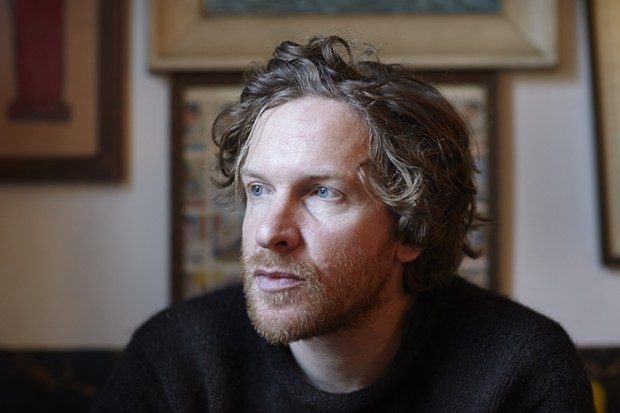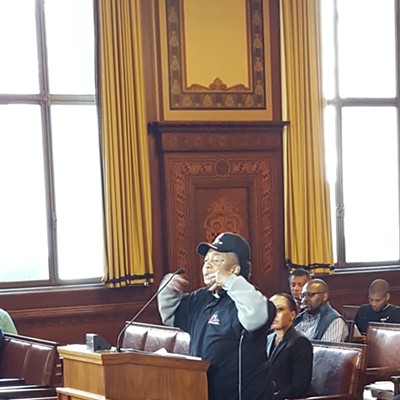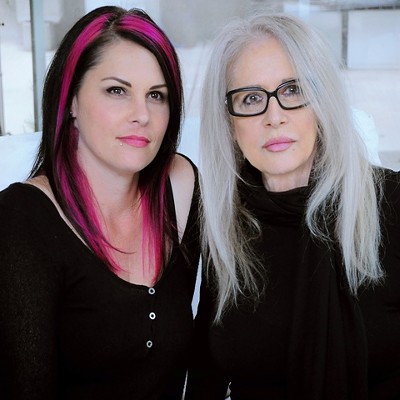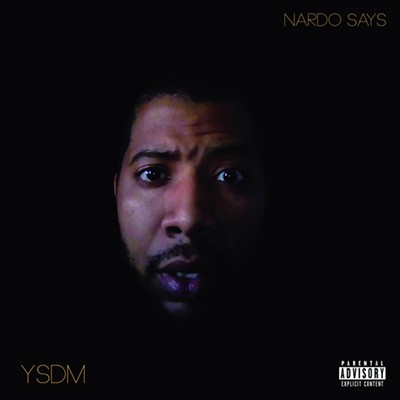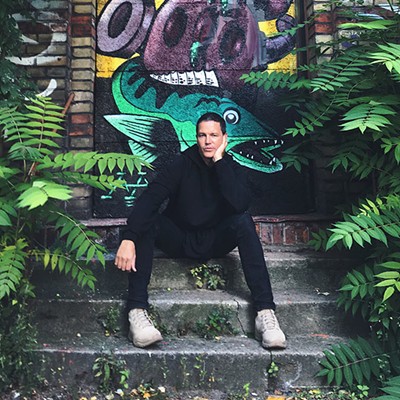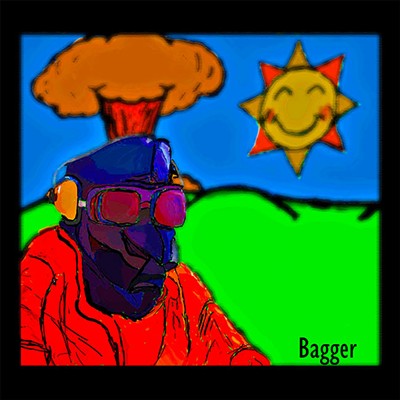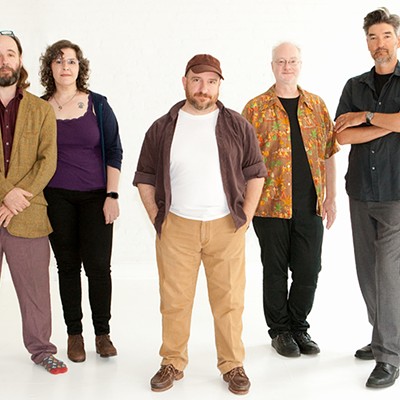Thursday, November 5, 2015
A conversation with Doug Paisley
Doug Paisley writes as heartbreakingly as George Jones and sings as sweetly as Gordon Lightfoot, but he's no revival act. Discussions of "authenticity" are usually pretty tenuous, but in an ever-expanding sea of bland neo-Americana, the Toronto-based singer-songwriter reads as The Real Deal (and The Band's Garth Hudson has appeared on two of his records, which is always a good endorsement.)
Paisley — whose last record, 2014's Strong Feelings was full of all the anguish and longing one would expect from a record with such a title — appears this weekend at the Pittsburgh Winery. He took some time to chat with City Paper about touring, fatherhood and — of course — strong feelings.
You just got back from touring in Spain. How was that?
It was fantastic. I’ve actually never been, but I have a big following there. It was a bit of a surprise but it was really an excellent tour.
What were some of the highlights?
I guess it’s kind of strange the different kinds of careers people can have now. Like, going there and all these people have all my albums and I’ve never made any connection to it. It kind of makes you wonder what impact you’re having in the world that you don’t really have a handle on, or any idea of. So it was very edifying to make that connection … but it was also unusual to be in such a new place and have people familiar with you.
I definitely met a lot of people who weren’t fluent in English … But people seem to always have a pretty emotional connection to certain songs … It kind of reaffirms the sense that music has a real life that’s totally outside of what you do with it.
There was a profile of you in Spin awhile back, where you talk about having a really strong emotional connection to music. What sort of emotional process do you go through when you’re writing songs and when you revisit those songs later?
I guess, as a comparison, some people really look to music for energy, which I never really identified with — like, upbeat music. But in the same way, if I really respond to something it’s because I’m having this emotional reaction to it. A lot of my favorite music is just … that feeling, you know? I guess that’s kind of the standard that I hold myself to when I’m developing something: am I having that kind of reaction to it? And it gets pretty broad. Eventually, you’re not just talking about one relationship or one break-up or one challenge, but it sort of becomes an amalgam and over time, as we have to go through things for better or for worse, we become familiar with them in a more general way. And as painful as some of those memories are, there’s also something very important about your identity in inhibiting them and revisiting them.
I don’t know if its masochistic or perverse [laughs] but I guess I have some kind of ongoing attachment to that or familiarity to those feelings, and I'm not afraid of them. I’ve always loved country music, for instance, and people sort of challenge me on it saying, “Oh this music is so sad, how can you listen to it?’ And I don’t put those two things together. I like that it’s sad and by the same token, I’m very comfortable with stuff that seems to make other people uncomfortable.
Men are stereotyped as being less emotional than women, and so for a male artist to put out an album called Strong Feelings is kind of …well, at first I think “that’s sort of unexpected.” But then there are all those classic male country singers who are very emotional in that way. Do you see any kind of gender divide in that way, in terms of people being afraid of feeling things or of being in touch with certain emotions?
Well, with [the phrase "strong feelings"], I always think that it’s an interesting one cause it is kind of a catch-all, and it does sort of allude to certain emotions more than something else might. But it’s also kind of vague and undefined and I think there’s something interesting about working in that realm.
But in terms of the gender thing, I think that in some very cliché and conventional way, particularly in straight male/female, men are from Mars, women are from Venus relationships, there’s often that frustration that guys don’t communicate in the ways that sometimes people would like them to ... But then they often are expressing these things in other places or in other ways … even if they don’t acknowledge it. I’ve always felt that I’ve put a lot of stuff into songwriting that it might have served me better in the short term to put into my daily life, but it’s really been the place where I’ve been comfortable exploring that stuff.
I really love the title Strong Feelings because anyone can kind of project whatever they want onto it.
It's very familiar. You’ve heard someone say ‘I have strong feelings about this’ … I definitely have had a few people kind of recoil from it, like it’s almost a bit too familiar.
I think I read that you started early on playing with Caribbean artists?
Yeah, I was really into reggae in highschool and the first times I ever played or performed in bands was in reggae bands. Toronto, where I’m from, has a really big Caribbean population, so there were all these Jamaican and Trinidadian musicians here. So those are the first people I started playing with.
Do you see any lasting influence of that?
I think it’s a complicated genre because I think for some people it purports to have a lot of spirituality and a lot of purity, but of course it runs the gamut right up to vary commercial. But I think at that age I identified with a certain purity of it — if not entirely music on an elevated plane, than I guess at least the possibility of that higher plane within music. I think that at the time it was a way to experience music that wasn’t just commercial or just cool or just whatever the scene required at the moment. I think having that and knowing about that possibility, even if it’s always going to be complicated, is something I’ve carried into what I do … it was kind of a spiritual guide for me when I was an adolescent in a lot of really interesting ways.
You’ve talked in the past about first getting into bluegrass, and it sounds like you developed a certain amount of anxiety about authenticity in relation to making more traditional music. I listen to your music and it sounds like it could be 50 years old. Is there anything you do to try to access an authentic voice?
Well, when I was really getting into bluegrass and stuff like that years ago — I don’t entirely know what I identified with that anxiety —but I definitely picked up on the fact that there were people who were like, “no you HAVE to do it this way. “
But in terms of what I do now, I think some of the most important things that I take from the older music I like are some simple technical things. Like, I try to record on tape, not necessarily because it makes you sound better, but because it makes you work a certain way. When I was a kid I was really into Bob Dylan and I heard that he recorded everything in one take. Which may not even be true … But I still adhere to that. So there are technical things like that which I think anyone could apply. But I’ve never tried to painstakingly recreate a certain era or a certain sound, and I think that’s always going to be a real trap. I don’t know, I don’t want to sound too brave about it, but I say, try to keep it uncontrolled and unmediated as you can and [trust] yourself ... that takes time, for sure.
Are you working on a record right now?
Yeah, I’m working with a few guys and we’ve recorded about 20 tunes already. So I think I will have a record pretty soon, I’m just in the middle of it. But in a very casual way, I mean we were just playing together all the time and then we were recording… It seems like it kind of snuck up.
You had a child in the last year, right? Has that impacted your songwriting in anyway, or your ability to write?
It’s not the best answer … I would say it definitely has, but I couldn’t say how. And that’s not because I can’t be bothered: it’s just that I’ve thought about it and I don’t exactly know. If nothing else, there was a real pause and now I’m writing more and it seems to be different but it's hard to know exactly what the change is.
I don't have kids, but it certainly seems like it changes your brain in some very real way.
Well, it changes your imperative in a way, and that sounds a bit banal but — really — how you work and how your time is structured. You think it’s the dream of a creative person to have all this space and time but eventually I think it can work against itself. I don’t have as much and that’s probably helped me out a bit.
DOUG PAISLEY and JOAN SHELLEY with DEVIN MOSES & THE SAVED. 7:30 p.m., Sun., Nov. 8. The Pittsburgh Winery, 2815 Penn Ave., Strip District. $10-12. 412-566-1000 or www.pittsburghwinery.com
Paisley — whose last record, 2014's Strong Feelings was full of all the anguish and longing one would expect from a record with such a title — appears this weekend at the Pittsburgh Winery. He took some time to chat with City Paper about touring, fatherhood and — of course — strong feelings.
You just got back from touring in Spain. How was that?
It was fantastic. I’ve actually never been, but I have a big following there. It was a bit of a surprise but it was really an excellent tour.
What were some of the highlights?
I guess it’s kind of strange the different kinds of careers people can have now. Like, going there and all these people have all my albums and I’ve never made any connection to it. It kind of makes you wonder what impact you’re having in the world that you don’t really have a handle on, or any idea of. So it was very edifying to make that connection … but it was also unusual to be in such a new place and have people familiar with you.
I definitely met a lot of people who weren’t fluent in English … But people seem to always have a pretty emotional connection to certain songs … It kind of reaffirms the sense that music has a real life that’s totally outside of what you do with it.
There was a profile of you in Spin awhile back, where you talk about having a really strong emotional connection to music. What sort of emotional process do you go through when you’re writing songs and when you revisit those songs later?
I guess, as a comparison, some people really look to music for energy, which I never really identified with — like, upbeat music. But in the same way, if I really respond to something it’s because I’m having this emotional reaction to it. A lot of my favorite music is just … that feeling, you know? I guess that’s kind of the standard that I hold myself to when I’m developing something: am I having that kind of reaction to it? And it gets pretty broad. Eventually, you’re not just talking about one relationship or one break-up or one challenge, but it sort of becomes an amalgam and over time, as we have to go through things for better or for worse, we become familiar with them in a more general way. And as painful as some of those memories are, there’s also something very important about your identity in inhibiting them and revisiting them.
I don’t know if its masochistic or perverse [laughs] but I guess I have some kind of ongoing attachment to that or familiarity to those feelings, and I'm not afraid of them. I’ve always loved country music, for instance, and people sort of challenge me on it saying, “Oh this music is so sad, how can you listen to it?’ And I don’t put those two things together. I like that it’s sad and by the same token, I’m very comfortable with stuff that seems to make other people uncomfortable.
Men are stereotyped as being less emotional than women, and so for a male artist to put out an album called Strong Feelings is kind of …well, at first I think “that’s sort of unexpected.” But then there are all those classic male country singers who are very emotional in that way. Do you see any kind of gender divide in that way, in terms of people being afraid of feeling things or of being in touch with certain emotions?
Well, with [the phrase "strong feelings"], I always think that it’s an interesting one cause it is kind of a catch-all, and it does sort of allude to certain emotions more than something else might. But it’s also kind of vague and undefined and I think there’s something interesting about working in that realm.
But in terms of the gender thing, I think that in some very cliché and conventional way, particularly in straight male/female, men are from Mars, women are from Venus relationships, there’s often that frustration that guys don’t communicate in the ways that sometimes people would like them to ... But then they often are expressing these things in other places or in other ways … even if they don’t acknowledge it. I’ve always felt that I’ve put a lot of stuff into songwriting that it might have served me better in the short term to put into my daily life, but it’s really been the place where I’ve been comfortable exploring that stuff.
I really love the title Strong Feelings because anyone can kind of project whatever they want onto it.
It's very familiar. You’ve heard someone say ‘I have strong feelings about this’ … I definitely have had a few people kind of recoil from it, like it’s almost a bit too familiar.
I think I read that you started early on playing with Caribbean artists?
Yeah, I was really into reggae in highschool and the first times I ever played or performed in bands was in reggae bands. Toronto, where I’m from, has a really big Caribbean population, so there were all these Jamaican and Trinidadian musicians here. So those are the first people I started playing with.
Do you see any lasting influence of that?
I think it’s a complicated genre because I think for some people it purports to have a lot of spirituality and a lot of purity, but of course it runs the gamut right up to vary commercial. But I think at that age I identified with a certain purity of it — if not entirely music on an elevated plane, than I guess at least the possibility of that higher plane within music. I think that at the time it was a way to experience music that wasn’t just commercial or just cool or just whatever the scene required at the moment. I think having that and knowing about that possibility, even if it’s always going to be complicated, is something I’ve carried into what I do … it was kind of a spiritual guide for me when I was an adolescent in a lot of really interesting ways.
You’ve talked in the past about first getting into bluegrass, and it sounds like you developed a certain amount of anxiety about authenticity in relation to making more traditional music. I listen to your music and it sounds like it could be 50 years old. Is there anything you do to try to access an authentic voice?
Well, when I was really getting into bluegrass and stuff like that years ago — I don’t entirely know what I identified with that anxiety —but I definitely picked up on the fact that there were people who were like, “no you HAVE to do it this way. “
But in terms of what I do now, I think some of the most important things that I take from the older music I like are some simple technical things. Like, I try to record on tape, not necessarily because it makes you sound better, but because it makes you work a certain way. When I was a kid I was really into Bob Dylan and I heard that he recorded everything in one take. Which may not even be true … But I still adhere to that. So there are technical things like that which I think anyone could apply. But I’ve never tried to painstakingly recreate a certain era or a certain sound, and I think that’s always going to be a real trap. I don’t know, I don’t want to sound too brave about it, but I say, try to keep it uncontrolled and unmediated as you can and [trust] yourself ... that takes time, for sure.
Are you working on a record right now?
Yeah, I’m working with a few guys and we’ve recorded about 20 tunes already. So I think I will have a record pretty soon, I’m just in the middle of it. But in a very casual way, I mean we were just playing together all the time and then we were recording… It seems like it kind of snuck up.
You had a child in the last year, right? Has that impacted your songwriting in anyway, or your ability to write?
It’s not the best answer … I would say it definitely has, but I couldn’t say how. And that’s not because I can’t be bothered: it’s just that I’ve thought about it and I don’t exactly know. If nothing else, there was a real pause and now I’m writing more and it seems to be different but it's hard to know exactly what the change is.
I don't have kids, but it certainly seems like it changes your brain in some very real way.
Well, it changes your imperative in a way, and that sounds a bit banal but — really — how you work and how your time is structured. You think it’s the dream of a creative person to have all this space and time but eventually I think it can work against itself. I don’t have as much and that’s probably helped me out a bit.
DOUG PAISLEY and JOAN SHELLEY with DEVIN MOSES & THE SAVED. 7:30 p.m., Sun., Nov. 8. The Pittsburgh Winery, 2815 Penn Ave., Strip District. $10-12. 412-566-1000 or www.pittsburghwinery.com
Tags: Doug Paisley , FFW>> , Image


